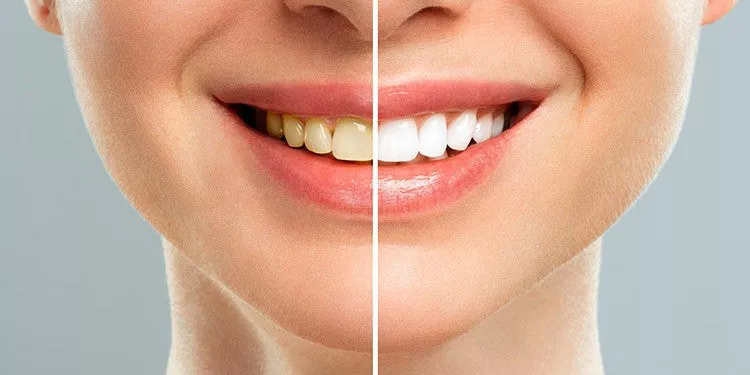Why Are My Teeth Yellow?
You may feel like As Tom Wilson once said, “A smile is happiness you’ll find right under your nose.” If you have a mouth full of dazzlingly white teeth, that phrase may ring true for you. However, your smile could also be a source of insecurity and concern if you suffer from yellow teeth. The good news is that if you struggle with this issue, there are many solutions regarding how to whiten your teeth – it’s just a matter of finding the right one that works for your unique situation.
you’re doing everything right when it comes to oral hygiene. You brush at least twice a day, floss, and keep up with your regular dental exams – but even so, you might still find yourself staring in the mirror and wondering, “Why are my teeth so yellow?” Yellow teeth causes vary, so in order to determine the right treatment, it’s important to know the primary cause of your yellow-tinged teeth.
Is it Normal to Have Yellow Teeth?
Why Are My Teeth Yellow When I Brush them Every Day?
Good oral hygiene is extremely important; however, just because you are a superstar when it comes to brushing doesn’t mean your teeth will be white. In fact, brushing too hard with certain strokes can actually wear away the enamel and lead to yellowing. The fact is, there are many factors outside of good brushing habits that can cause teeth to be yellow, so stay the course when it comes to keeping your teeth clean. Brush thoroughly and properly with the right toothbrush and consult your dentist if you have persistent yellowing that worsens over time.
What Causes Yellow Teeth?
Staining
There are different types of staining to consider when it comes to your teeth. Stains can be intrinsic, meaning below the enamel, or extrinsic, meaning stains that are on the surface of the enamel itself.
Extrinsic stains are often caused by food and drinks that are highly likely to stain the teeth, such as coffee, red wine, berries, and tomatoes. Choosing food and drinks carefully, considering their effect on your teeth, can greatly reduce the amount of staining. Extrinsic stains are generally easier to control and easier to treat once they’re set in place.
Over-Zealous Brushing
It’s great to have a passion for good oral hygiene and brush thoroughly to fight bacteria buildup that can lead to plaque and tartar. But be careful that you don’t get too excited and brush with a heavy hand, particularly in a rough side-to-side motion - brushing too hard (especially with a toothbrush that has hard bristles) can wear away the enamel, causing those yellowish lower layers of dentin to be more apparent at the surface. You might feel like your teeth are getting cleaned, but the result over time could be a significant yellowing of the teeth.
Poor Oral Hygiene
Tobacco Use
It’s no secret that tobacco use is extremely harmful to your overall and oral health. Not only does it lead to an array of diseases, but it wreaks havoc on your teeth. When nicotine reacts with oxygen, it takes on a yellowish or even brown color that creates stains.
Genetics
Everyone is unique in their genetic makeup, and some people are genetically predisposed to have thicker, whiter enamel than others. On the contrary, some family lines tend to have dull or yellowed teeth from generation to generation.
The Aging Process
How to Get Rid of Yellow Teeth
Yellow teeth can have a negative effect on self-esteem and can affect the way others relate to you, both personally and professionally. Consequently, most people are eager to know how to get white teeth. The good news is that there are many options, including professional treatments, at-home treatments, and even natural home remedies if you’re specifically interested in how to whiten teeth naturally. The most effective treatment for you will depend on several factors, so be sure to determine the cause of your yellow teeth in order to choose the appropriate method for whitening.
Professional Whitening
Veneers
Veneers are a great option for a smile makeover, especially when you have stubborn intrinsic stains. There are different types of veneers with various methods of application. Still, all have the same general result – they act as a sort of shell that covers the teeth, which allows you to choose the shade of white for a uniform look that will cover any discoloration present.
How to Whiten Teeth at Home
Natural Whitening Remedies
- Applying a paste made of one tablespoon baking soda and two tablespoons hydrogen peroxide directly to the teeth, or choosing a toothpaste that has those ingredients
- Using an activated charcoal toothpaste
- Decreasing consumption of food and drinks that stain teeth
Find a Cosmetic Dentist Near You to Whiten Your Teeth
If you’re new in town and asking where to find a dentist near me or just looking for a fresh start with a highly qualified, capable professional, check out the Smile Generation Find a Dentist tool to connect with a cosmetic dentist in your area.
Find your trusted, local dentist today!
Sources
- Colgate. (2023). Ten causes of yellow teeth and how to avoid them. Colgate. https://www.colgate.com/en-us/oral-health/adult-oral-care/ten-causes-of-yellow-teeth-and-how-to-avoid-them
- Medical News Today. (2019, October 8). What causes yellow teeth and how to fix them. Medical News Today. https://www.medicalnewstoday.com/articles/321172#dental-remedies
- Colgate. (2024). Teeth stain removal: Types, tips, and options. Colgate. https://www.colgate.com/en-us/oral-health/teeth-whitening/teeth-stain-removal-types
- American Dental Association. (n.d.). Whitening. American Dental Association. https://www.ada.org/resources/ada-library/oral-health-topics/whitening/
- Crest. (n.d.). Teeth stains: Causes, types, and how to remove them. Crest. https://crest.com/en-us/oral-care-tips/teeth-stains/teeth-stains-causes-types-how-remove-teeth-stains
- WebMD. (n.d.). Tooth discoloration: Causes, prevention, and treatment. WebMD. https://www.webmd.com/oral-health/tooth-discoloration
Smile Generation blog articles are reviewed by a licensed dental professional before publishing. However, we present this information for educational purposes only with the intent to promote readers’ understanding of oral health and oral healthcare treatment options and technology. We do not intend for our blog content to substitute for professional dental care and clinical advice, diagnosis, or treatment planning provided by a licensed dental professional. Smile Generation always recommends seeking the advice of a dentist, physician, or other licensed healthcare professional for a dental or medical condition or treatment.








